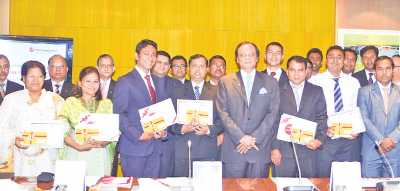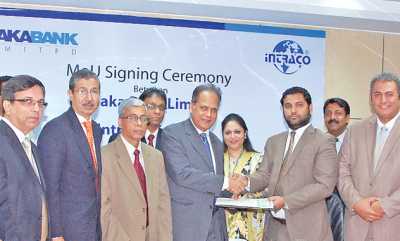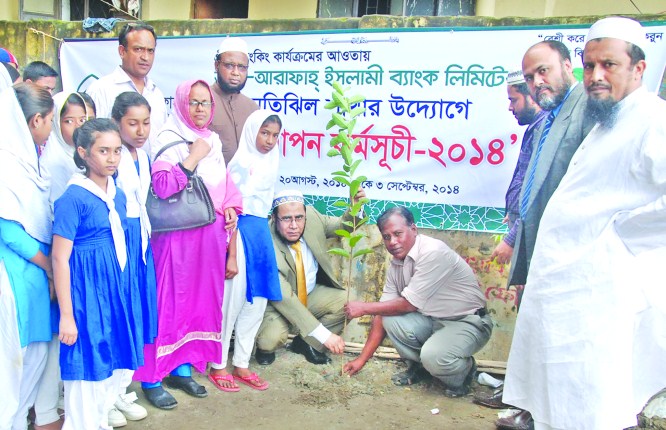MTB-MG award giving ceremony held in city

The award giving ceremony of Mutual Trust Bank Ltd. (MTB)–MoneyGram (MG) Teller Incentive Programme (TIP) 2014 was held at MTB’s corporate head office at MTB Centre at Gulshan in Dhaka recently.
Six MTB branches were awarded in this target-based competition under Gold, Silver and Bronze categories, said a press release.
Dhaka Bank signs MoU with Intraco

Dhaka Bank Limited signed a Memorandum of Understanding (MoU) with Matrix, one of the sister concerns of Intraco Limited, at the bank’s head office in Dhaka on Wednesday.
As per the MoU, the company will provide 10,000 prepaid Hajj SIM cards to Dhaka Bank Limited for distributing among the Bangladeshi Hajj pilgrims.
AAIBL Motijheel Branch arranges ‘Tree Plantation Campaign 2014’

Al-Arafah Islami Bank Ltd. Motijheel Branch arranged ‘Tree Plantation Campaign 2014′ under it Green Banking program in Maniknagar Model High School on September 01, 2014, reports in press release.
Executive Vice President & Manager of the branch Md. Fazlul Karim was present as the Chief Guest in the ceremony. Among others, Vice President of the Bank Md. Abu Shah Jalal Azad, First Assistant Vice President Md. Nasir Ahmed, Md. Zakir Hossain and Md. Enamul Haque were present on the occasion.
Throughout the 15 days campaign Al-Arafah Islami Bank Ltd. is planting more than 25 thousand trees all over the country. All branches of the Bank are carrying on the program.
BB eases forex rule to expedite FDI Print Edition
Bangladesh Bank (BB) yesterday eased further the foreign exchange regulations to expedite foreign direct investment (FDI), reports BSS.
The central bank in a directive lifted the regulation that made submission of documents for outward remittance mandatory. According to the latest circular, the authorised dealers would no longer require to submit documents in support of outward remittances, already approved by BB. The central bank said that the change have been brought to ease further the routine reporting to BB under the broad spectrum of foreign exchange liberalization.
BB on Sunday brought some changes to the repatriation of sale proceeds of non-resident owned equity in unlisted companies purchased by residents.
Basel III deposit challenge looms over Islamic banks
As banks around the world gear up to meet tough Basel III regulatory standards, Islamic lenders face a source of uncertainty that could prove expensive for them: how regulators will treat their deposits.
In most ways, Islamic banks look well-placed to cope with Basel III, which will be phased in across the globe over the next few years. Most of the banks are from the Gulf and southeast Asia, where economies are strong.
Since Islamic finance frowns on monetary speculation, their balance sheets are largely clear of the derivatives and complex, risky assets that sunk some of their conventional peers during the global financial crisis. They should therefore have little trouble in meeting Basel III's minimum capital standards.
But their deposit bases could become a headache. Because interest payments are not allowed by sharia principles, Islamic banks obtain deposits mostly through profit-sharing investment accounts (PSIAs), which are generally considered to be more volatile than conventional deposits.
Islamic banks are expected to be required to offset that volatility under Basel III by increasing the amount of high-quality liquid assets (HQLAs) which they hold.
But Islamic securities markets are much younger, shallower and less developed than conventional markets, so sharia-compliant HQLAs are in short supply - squeezing Islamic banks on two fronts.
"These are two of the more important challenges that Basel III is introducing to the Islamic finance industry," said Paris-based Mohamed Damak, primary credit analyst at credit rating agency Standard & Poor's.
Islamic commercial banks held about $1.2 trillion worth of assets at the end of last year, according to a study by Thomson Reuters. They account for roughly a quarter of deposits in Gulf Arab countries and over a fifth in Malaysia.
Basel III requires banks to hold enough HQLAs to cover net cash outflows for a 30-day period under a high-stress scenario. Outflows are calculated by applying different weights to funding sources, including PSIAs. The riskier the funding source, the larger the amount of HQLAs needed to cover it.
So a lot will depend on the weights or "run-off rates" which national regulators around the world, who will implement Basel III in their own jurisdictions, choose to assign to PSIAs.
Regulators have yet to give an indication of the likely weights. They are keen to develop their Islamic banking sectors, so they are unlikely to assign punitive weights. But they may not be able to treat PSIAs as benignly as conventional bank deposits. For instance, PSIAs held by Islamic banks tend to have relatively short maturities, according to an S&P report.
The treatment of PSIAs will also depend on factors specific to the Islamic banking industry in each country, such as how it behaved in past stress situations, and the track record of Islamic banks in passing losses on to deposit holders under their contracts, Damak said.
The uncertainty looks unlikely to be cleared up at least until early next year, when the Malaysia-based Islamic Financial Services Board (IFSB), a global standard-setting body, is expected to release a guidance note on the subject.
"Ultimately it is the regulator in each country that will decide what will be the treatment of PSIAs, and here the IFSB guidance note will be of significant value to help regulators decide how to treat PSIAs," Damak said.
The note will deal with issues such as the contractual rights of depositors, for example whether they can withdraw money in fewer than 30 days without a significant penalty, said a source familiar with the IFSB's deliberations.
Malaysia's central bank has issued some guidance on PSIAs, saying it will classify them as two types: general PSIAs, broadly equivalent to conventional retail deposits, and specific or restricted PSIAs, deemed similar to managed investment accounts. It has given Islamic banks a two-year transition period to differentiate between those types.
But while the central bank has already spelled out ratios and weights for Basel III capital adequacy rules, it has not yet announced run-off rates or HQLA requirements for PSIAs. Commercial bankers think these might be revealed early next year, after the IFSB guidance.
Basel III says national regulators around the world could assign run-off rates of 3 percent or higher to stable, conventional bank deposits, and as much as 10 percent to less stable deposits, according to S&P.
Most Islamic banks may end up being assigned numbers within that range; given the size of the deposits at stake, a variation of several percentage points could make a big difference to how much HQLAs the banks are forced to hold.
The PSIA issue may increase pressure on central banks and governments around the Islamic world to address some longstanding problems in Islamic finance. One is the small supply of HQLAs. With the exception of Malaysia and Bahrain, few central banks actively issue instruments which qualify as HQLAs, Damak said.
Government-issued sukuk qualify, but most sovereign sukuk are either not listed on developed markets or are not actively traded, making it very hard for Islamic banks to obtain them. This contrasts with conventional banks' access to huge markets in high-quality government debt such as U.S. Treasuries and German Bunds.
Alternatives such as the short-term sukuk issued by the Malaysia-based International Islamic Liquidity Management Corp, which was established to promote a cross-border market in Islamic instruments, remain small compared with the overall size of the industry, Damak noted.
As part of its efforts to develop as an Islamic financial centre, Dubai is actively trying to list sukuk on its exchanges and encouraging its state-linked firms to issue tradeable sukuk, but it may be years before supply begins to meet demand.
Another problem is deposit insurance. For bank deposits to be deemed stable they need to be protected by an insurance scheme, but sharia-compliant schemes are rare, partly because government support for domestic banks is considered implicit in many Gulf countries.
News:The Daily Star/3-Sep-2014



